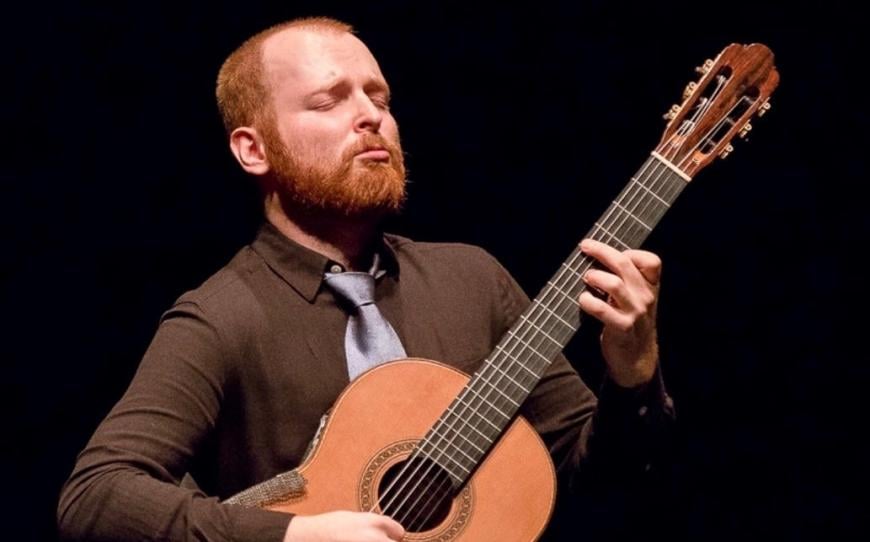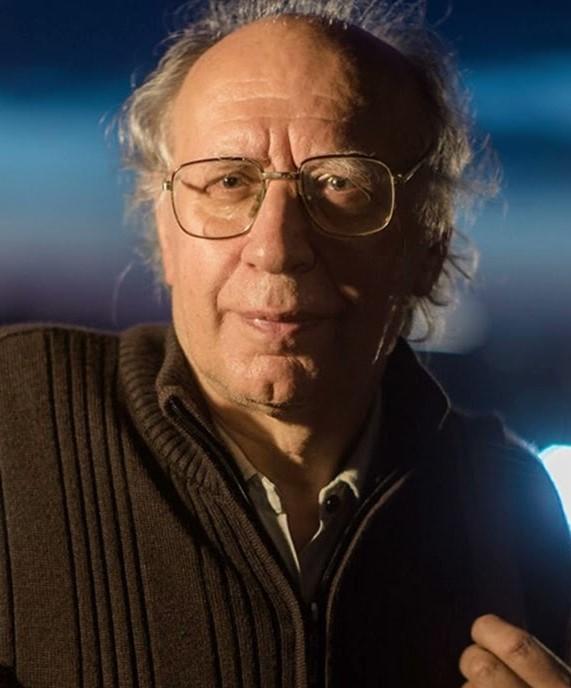
Ukrainian guitarist Marko Topchii, a rising star in the international classical guitar world, gave an impressive recital on Tuesday, Sept. 27 at St. Mark’s Lutheran Church in San Francisco that featured music of the Ukrainian composer Valentin Silvestrov. It was Topchii’s second appearance for the Omni Foundation for the Performing Arts. The first, still available online, was filmed during the pandemic at the beautiful St. Andrew’s Cathedral in Kyiv, Ukraine.
J.S. Bach’s Suite in E Minor, BWV 996, led off the concert. Topchii emphasized the Prelude’s improvisatory nature with dramatic contrasts of rhythm, dynamics, and timbre. The subsequent five Baroque dances were transformed by Bach into profound spiritual statements. While there is still a great deal of discussion among scholars about whether Bach intended this music for Baroque lute or a keyboard instrument capable of imitating the lute’s intimate sound, in Topchii’s hands it was all perfectly suited to the guitar. Particularly notable were the variety and richness of the ornamentation Topchii used to intensify dissonances or simply to add grace and expression to the performance.

Silvestrov, Ukraine’s best-known living composer, has become a musical spokesman for his country. And like millions of Ukrainians, he has been turned into a refugee by the current conflict with Russia. In the meantime, his music has recently been performed by the London Symphony and Philharmonic the Berlin, as well as at a major concert presented by the Metropolitan Opera. His Kitsch-Music No. 1 was originally written for piano and brilliantly transcribed for guitar by Topchii.
“Kitsch” is a term which refers to art that is excessively sentimental, but Silvestrov reclaims the profundity of deeply felt emotion with sincere music reminiscent of Franz Schubert’s Impromptus or Robert Schumann’s Scenes From Childhood. Topchii’s performance eschewed shallow virtuosity, though there was extraordinary skill behind his self-effacing performance.
Leo Brouwer’s La Gran Sarabanda returned the recital to the sound world of Baroque dance, albeit with fascinating contemporary overtones. Like Bach, Brouwer transforms a simple dance into an artistic statement, adding elaborate ornamentation, more modern metric complexity, and cultural allusions. Topchii told the audience this has been a favorite of his since its composition in 2018, and he handled the challenges with aplomb.
The music of Polish composer Alexandre Tansman was championed by the great 20th-century virtuoso Andrés Segovia, but the Passacaille, composed in 1953, languished unheard in Segovia’s library for almost 50 years before it was discovered by Angelo Gilardino. Topchii performed the opening bass ostinato with expressive restraint and built the subsequent variations and culminating fugato with an ear to the masterfully built formal structure.
Gilardino, meanwhile, had a long career as a performer before he was encouraged to compose by Mario Castelnuovo-Tedesco. His Etude No. 19 (“Jondo”) is an homage to the Spanish composer Joaquín Turina, and Topchii perfectly captured the references to flamenco music with an aggressive tone and improvisatory rhythm.
Topchii infused Arnaud Dumond’s Comme un hommage à Ravel with a sincerity of emotion similar to his earlier performance of the Silvestrov. He followed this by playing a long-lost score by the great Spanish composer Joaquín Rodrigo, unearthed in 2005 in the papers of its dedicatee, Regino Sainz de la Maza. The piece was written in 1933 but never performed. It seems to have been ahead of its time, so it’s perfect for the astonishing virtuosos of the 21st century, like Topchii.
The concert concluded with Agustín Barrios’s Un Sueño en la Floresta (Dream in a glade). Of this vision, Barrios wrote: “Tupa, the supreme spirit and protector of my race, found me one day in the middle of a verdant glade … while admiring nature. He said to me: ‘Take this mystery box and unmask its secrets.’ … Obeying the orders of Tupa, I took the box, and placing it close to my chest, I embraced it and spent many moons at the side of a spring. One night Jacy, painted in liquid crystal, feeling the sadness of my Indian soul, gave me six silver rays of light. … And the miracle occurred: From the depths of the mysterious box, there emerged a marvelous symphony of all the virgin voices of our America.”
Topchii gave us a marvelous symphony.



